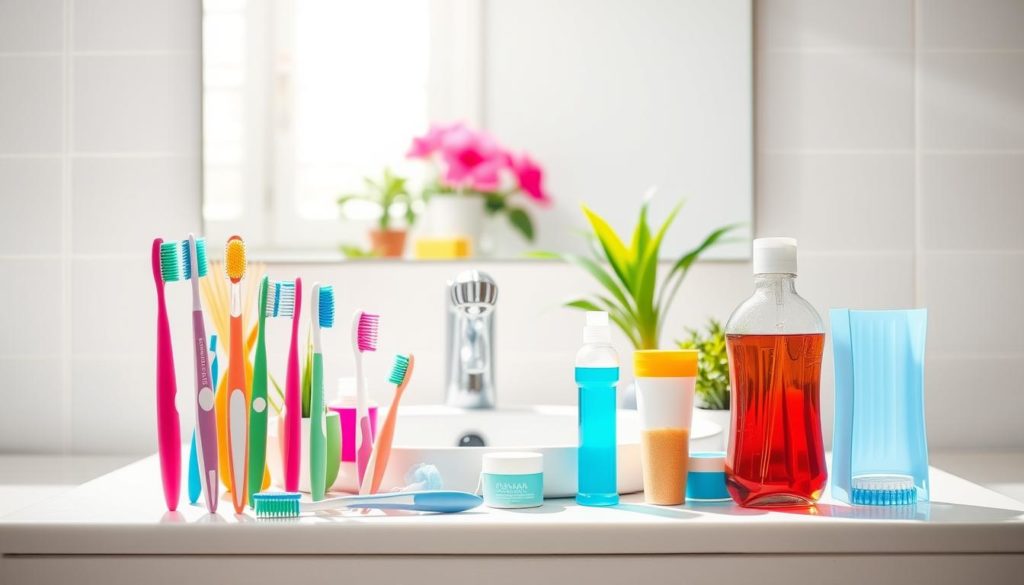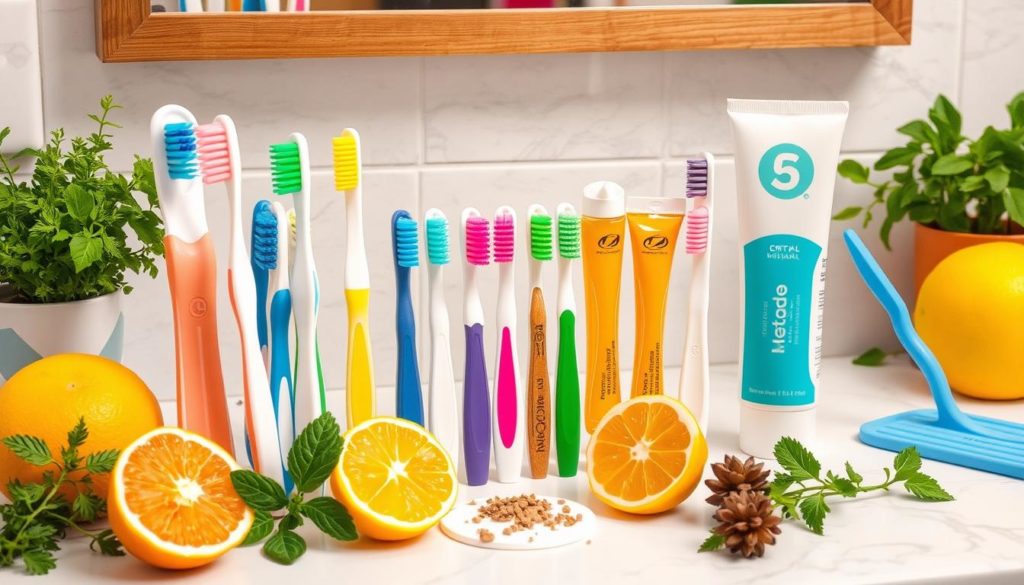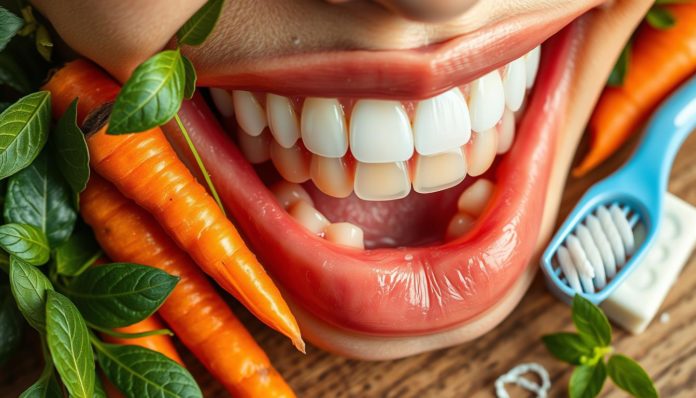Your mouth health is key to your overall health. It affects how you talk, eat, and meet people. Having a solid oral hygiene success plan can ward off diseases. It also makes you feel good about yourself and saves money on doctor’s visits. By sticking to great dental hygiene routines, choosing healthy foods, and seeing your dentist regularly, anyone can keep their mouth clean. Good pristine oral hygiene will help your whole body stay healthy. Here, find the top healthy gums advice to keep you feeling great, inside and out.
The Importance of Daily Oral Hygiene
Keeping up with daily oral hygiene stops tooth decay and gum disease. Good teeth cleaning habits help keep your mouth healthy. They also stop cavities from starting.

Brushing Techniques
Brushing right keeps teeth healthy. Make sure you brush for two minutes. Use a 45-degree angle to clean well. This method cleans your teeth and gums every day.
Flossing Best Practices
Flossing well gets rid of plaque where a toothbrush can’t. Flossing every day stops cavities and keeps your breath fresh. It helps your overall health, too.
Choosing the Right Toothbrush and Toothpaste
Finding the perfect toothbrush and toothpaste is key for top oral care. Your choice greatly impacts your dental hygiene routine.

Manual vs. Electric Toothbrushes
Choosing between manual and electric toothbrushes depends on what you need and do. Soft-bristled brushes are best since they’re gentle on gums and teeth. The right toothbrush head size is also important. A smaller head cleans hard-to-reach spots well.
Electric toothbrushes are better at getting rid of plaque for those who can’t move well. But, a manual toothbrush works great if you use it the right way. Let’s compare them:
| Type | Benefits | Considerations |
|---|---|---|
| Manual |
|
|
| Electric |
|
|
Fluoride and Sensitivity Toothpastes
Choosing the best toothpaste is also crucial for dental health. Fluoride toothpaste is usually the go-to because it strengthens enamel and fights cavities. Here are some oral hygiene tips for adults about toothpaste:
- If your teeth are sensitive, look for a toothpaste made to ease discomfort from hot, cold, or pressure.
- A toothpaste designed for gum health is good for those at risk of gingivitis.
- Talking to a dentist can help find the right toothpaste for you.
Healthy Eating Habits for Better Oral Health
Eating well is key for a healthy mouth. You can improve your oral health by choosing the right foods. Here are some key healthy mouth tips for better oral care:
Avoiding Sugary Snacks and Drinks
Sugary snacks and drinks lead to tooth decay and enamel erosion. Cut down on these to protect your teeth. Choose water, fruits, and nuts over sugary sodas and candy. This helps your teeth and your overall health.
Incorporating Nutrient-rich Foods
A diet full of fruits, vegetables, lean proteins, and whole grains is great for your mouth. Dairy products add calcium, which strengthens tooth enamel. Crunchy vegetables like carrots clean your teeth as you eat. Eating these foods gives your mouth the nutrients it needs.
Preventing Cavities and Tooth Decay
Keeping your mouth clean is key to stopping cavities and tooth decay. To have a bright smile, brush and floss every day. Using fluoride toothpaste adds extra defense against cavities.
Cutting down on sugary and acidic foods is also important. These foods can lead to cavities. Eating less of them can make your teeth healthier.
Seeing your dentist regularly is important for preventing cavities. They can clean your teeth well and find any problems early. Dentists can also give you tips to keep your teeth strong and healthy.
Getting fluoride treatments at check-ups helps fight cavities. Fluoride makes your teeth’s outer layer stronger against decay. Talk to your dentist about fluoride treatments that are right for you.
Drinking water helps too because it keeps your mouth clean. It lowers the chance of getting cavities. Make sure to drink plenty of water every day.
Following these tips can help you achieve a lovely smile. By making them part of your daily life, your mouth will stay healthy.
Healthy Mouth Tips
Having a good dental hygiene routine is very important for your mouth’s health. By doing simple things like going to the dentist regularly and using mouthwash, you can greatly improve your dental care.
Regular Dental Check-ups
Seeing your dentist often is a big part of keeping your teeth healthy. Your dentist will clean your teeth, check for any problems, and give you advice on how to take better care of your mouth. Going for these check-ups helps catch diseases like gum disease or cavities early, so they can be treated quickly.
Using Mouthwash
Mouthwash is a great addition to brushing and flossing. It gets to places that might be missed otherwise, killing germs and keeping your breath fresh. It also helps stop plaque from building up, which is good for your overall dental health.
The Impact of Oral Health on Overall Well-being
Understanding how oral health affects your whole well-being is key. It ensures a vibrant and healthy lifestyle. It’s more than just a bright smile; it links to other health aspects.
Link Between Oral Health and Systemic Diseases
Studies have discovered a systemic diseases link with bad oral hygiene. Conditions like gum disease may lead to heart problems, diabetes, and even breathing issues. Ignoring oral care lets mouth bacteria cause infections and inflammation elsewhere.
To learn more about these connections, check out the Mayo Clinic’s guide on oral health.
Oral Health and Quality of Life
Great oral hygiene majorly lifts your quality of life. It keeps you from pain and discomfort and boosts confidence. Plus, it makes eating, talking, and smiling better and more fun.
Steering clear of dental problems also cuts down on stress. This, in turn, betters your mental well-being.
Common Oral Health Issues and How to Avoid Them
Many people deal with oral health problems like gum disease and tooth sensitivity. These can impact our overall health. But, if we practice good oral hygiene and eat right, we can prevent these issues. It’s important to spot early signs such as bleeding gums or pain when eating to keep our mouths healthy.
Gum Disease
Gum disease, or periodontal disease, is caused by plaque making the gums angry. This can lead to red and swollen gums that bleed. Here’s some healthy gums advice: Brushing twice a day and flossing can help remove this plaque. Regular visits to your dentist for cleaning and check-ups are also key. These steps can stop gum disease from developing.
Tooth Sensitivity
Many of us feel pain or discomfort in our teeth when eating or drinking something hot, cold, or sweet. But there are ways to fight this sensitivity. Try toothpaste made for sensitive teeth to protect your enamel and cut back on foods and drinks that are acidic or sugary. Using a soft-bristled toothbrush and being careful with hot or cold drinks can also help.
Role of Fluoride in Oral Hygiene
Fluoride is key in making our teeth strong. It helps prevent cavities, keeping our smiles healthy for a long time. It’s important to use fluoride daily to protect our teeth.
Fluoride acts like a shield for our teeth. It fights off harmful bacteria that can cause decay. Using products with fluoride, like toothpaste and mouthwash, keeps our teeth in top shape.
It also fixes early tooth decay and stops more damage. This is why dentists tell us to use fluoride toothpaste and mouthwash. They know it’s good for our teeth.
Benefits of Drinking Water for Oral Health
Drinking water is crucial for oral health, offering many benefits. It goes beyond quenching thirst. Water keeps your mouth healthy by promoting hydration and enhancing saliva.
Hydration and Saliva Production
Drinking water boosts both hydration and saliva production. Adequate saliva washes away food and neutralizes harmful acids. Thus, staying hydrated is a top tip for preventing cavities.
Neutralizing Acids and Preventing Decay
Water consumption plays a key role in neutralizing acids and preventing tooth decay. It keeps pH levels balanced, reducing enamel erosion and cavity risk. This simple habit highlights the oral health hydration benefits.
Including more water in your routine aids in cavity prevention and supports oral health.
Maintaining Oral Hygiene on the Go
Keeping your teeth clean while traveling is key to good dental health. Busy lives mean we’re often away from home, making it hard to follow our usual tooth-cleaning routines. But, with things like travel toothbrushes, mini toothpaste, and dental floss, taking care of your teeth becomes simple.
Travel toothbrushes are small and fit easily into your bag. This means you can brush your teeth anywhere after eating. Add in tiny tubes of toothpaste found in travel aisles, and your dental care stays strong and easy. Dental floss, like the single-use sticks, is great for cleaning between your teeth on the move.
Another smart tip is to carry sugar-free gum. It boosts saliva and fights mouth acids after you eat. If you can’t brush right away, chewing gum is a quick fix to keep your mouth clean. With these simple steps, you can keep up with your oral hygiene anywhere, no matter how busy you are.
FAQ
What are some top healthy mouth tips for pristine oral hygiene?
Start with a solid dental hygiene routine. Focus on keeping your gums healthy. Use the right brushing and flossing techniques. Choose the best toothbrush and toothpaste for you.
Why is daily oral hygiene important?
Daily care stops tooth decay and gum disease. It also improves your breath. This keeps your mouth and body healthy.
What are the best brushing techniques?
Spend at least two minutes on brushing. Hold your brush at a 45-degree angle. Clean all surfaces and your gum line well.
What are some flossing best practices?
Floss correctly to remove plaque where a brush can’t reach. This keeps your breath fresh and your body healthy.
How do I choose between a manual and an electric toothbrush?
Manual brushes work well if used right. Electric brushes can clean better for people with mobility issues.
What should I consider when selecting fluoride and sensitivity toothpastes?
Fluoride toothpaste strengthens teeth and fights cavities. If cold or heat bothers your teeth, choose a toothpaste for sensitive teeth.
How do avoiding sugary snacks and drinks benefit oral health?
Cutting back on sugar fights tooth decay and protects your enamel. This keeps your mouth healthy.
What should I incorporate into a nutrient-rich diet for better oral health?
Eat fruits, vegetables, lean proteins, and whole grains. They provide nutrients for a strong mouth and body.
What are effective ways to prevent cavities and tooth decay?
Brush regularly with fluoride toothpaste. Floss, avoid sugary and acidic foods, and get dental cleanings to prevent cavities.
How do regular dental check-ups contribute to oral health?
Dentists check your oral health, treat problems, and prevent new ones. This keeps your teeth strong and healthy.
What are the benefits of using mouthwash?
Mouthwash fights bacteria that brushing and flossing may miss. It also tackles bad breath and plaque, boosting oral health.
How does oral health impact overall well-being?
Bad oral health can lead to serious diseases like heart disease and diabetes. It affects eating, speaking, and self-esteem too.
What is the link between oral health and systemic diseases?
Gum disease can connect to other serious conditions like heart disease and respiratory illnesses. So, taking care of your mouth is crucial.
How does oral health affect quality of life?
Good oral health boosts confidence and happiness. It helps you eat, talk, and socialize without trouble.
What are common signs and preventive measures for gum disease?
Bleeding gums and eating pain may signal gum disease. Stopping it includes good oral care and eating right.
How can I manage tooth sensitivity?
Use toothpaste for sensitivity. Also, don’t skip your oral hygiene routine. This can reduce discomfort from cold or pressure.
Why is fluoride crucial in oral hygiene?
Fluoride makes tooth enamel strong and wards off cavities. It’s a shield against harmful bacteria.
How does drinking water benefit oral health?
Water keeps you hydrated and boosts saliva, which cleans food bits and acid, stopping tooth decay.
What are the advantages of maintaining oral hygiene on the go?
With travel-sized brushes, toothpaste, and floss, you can keep your mouth clean anywhere. This stops dental problems even when you’re busy.


